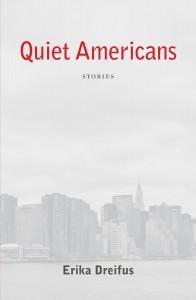Thursday’s Post-Publication Post: Six Months Later
 We passed a milestone this week, my friends: Tuesday, July 19, marked the six-month birthday of my short-story collection, Quiet Americans, which was released on January 19. So it seems appropriate to pause and consider a few things–including the future of “Thursday’s Post-Publication Posts.”
We passed a milestone this week, my friends: Tuesday, July 19, marked the six-month birthday of my short-story collection, Quiet Americans, which was released on January 19. So it seems appropriate to pause and consider a few things–including the future of “Thursday’s Post-Publication Posts.”
As my friend and fellow author Ellen Meeropol–whose debut novel, House Arrest, was similarly released last winter–recently suggested, there comes a time when the promotional work recedes (or should recede), and the generation of new work takes precedence. I didn’t necessarily intend it, but I am, at this time, becoming increasingly forward-looking, too.
I’m by no means ready to abandon my precious Quiet Americans (more about that in a moment), but various forces are motivating me to think that these Thursday posts should gain a new focus (and some new titles). I welcome your thoughts about this. I will say that I’ve noticed that several writers-who-blog incorporate regular “Confession” posts, and that’s tempting (for two examples, albeit material that posts regularly on Tuesdays, see the blogs by Kelli Russell Agodon and January Gill O’Neil). But I blogged before I had a daily post “theme,” and I can do so again.
Things to think about!
Meantime, as I said, I am by no means ready to part ways with my beloved Quiet Americans! I’m still arranging events, I’m still doing interviews (please see the latest one over on The Story Prize blog), and–this is very important–I am still available to call in and join your book clubs for conversation!
Less publicly, I continue to receive lovely, always-to-be-cherished messages from readers. Which reminds me: It’s never too late for you fans to post your glowing words on Amazon, Goodreads, or any other review venue you may choose.
Six months in, it’s been a great ride. And for that, I am exceedingly grateful. Thank you.